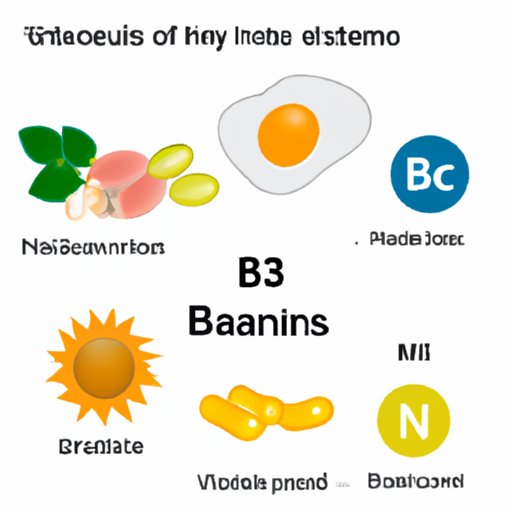
Introduction
Vitamin B3, also known as niacin, is an essential nutrient that plays a vital role in keeping our bodies healthy and functioning properly. In this article, we’ll explore the benefits, functions, and food sources of vitamin B3, as well as address common questions and misunderstandings about this important nutrient.
A Comprehensive Guide to Understanding Vitamin B3: Benefits, Functions, and Food Sources
Vitamin B3 is a water-soluble vitamin that is part of the B-complex family. Chemically, it can exist in several forms, including nicotinic acid, niacinamide, and inositol hexanicotinate. Each form has a slightly different function within the body.
Nicotinic acid helps lower cholesterol and triglycerides, while niacinamide is more involved in cellular metabolism and energy production. Inositol hexanicotinate is a form of niacin that is often used as a dietary supplement to treat circulation problems and high cholesterol.
Regardless of the form, vitamin B3 plays a crucial role in a variety of bodily functions. It helps convert food into energy, regulates cholesterol levels, supports brain function, and aids in the repair and maintenance of DNA.
Thankfully, vitamin B3 is readily available in a range of food sources. Some of the best sources of vitamin B3 include poultry, fish, nuts, and whole grains.
The Top 5 Health Benefits of Vitamin B3: What You Need to Know
Vitamin B3 has a host of benefits for the body, including:
1. Improved brain function: Vitamin B3 plays a key role in producing neurotransmitters, which are essential for proper brain function. It has also been linked to a reduced risk of Alzheimer’s disease and cognitive decline.
2. Lowered risk of heart disease: Vitamin B3 helps regulate cholesterol levels, which can reduce the risk of heart disease. It also helps improve blood flow, preventing circulation problems and reducing the risk of heart attacks and strokes.
3. Reduced inflammation: Vitamin B3 has anti-inflammatory properties, which can help reduce inflammation throughout the body and prevent chronic diseases like arthritis and cancer.
4. Better digestion: Vitamin B3 aids in the production of stomach acid, which is essential for proper digestion. It can also help alleviate symptoms of gastrointestinal disorders like Crohn’s disease and ulcerative colitis.
5. Improved skin health: Vitamin B3 has been linked to a host of benefits for skin health, including reducing hyperpigmentation, minimizing fine lines and wrinkles, and improving overall skin texture and tone.
The Importance of Vitamin B3 for Your Body: How It Promotes Better Health
While the benefits of vitamin B3 are numerous, it’s important to note that this vitamin doesn’t work alone. Vitamin B3 works in conjunction with other vitamins and minerals to optimize bodily functions.
For example, vitamin B3 works with vitamin B6 and B9 to regulate homocysteine levels in the blood, which can reduce the risk of heart disease. It also works with zinc to improve immune function and with calcium to regulate blood pressure.
Everything You Need to Know About Vitamin B3: A Beginner’s Guide
As with any nutrient, there are some common questions and misconceptions surrounding vitamin B3. Here are a few to keep in mind:
Can you overdose on vitamin B3? Yes, vitamin B3 can be toxic in large doses. The upper limit for adults is 35mg per day. High doses of vitamin B3 can cause flushing, itching, and liver damage.
Is it safe for pregnant women? Yes, vitamin B3 is perfectly safe for pregnant women, and is crucial for healthy fetal development. Pregnant women should aim to get 18mg of vitamin B3 per day.
What are the differences between niacin and niacinamide? As mentioned earlier, niacin and niacinamide are different forms of vitamin B3. While they have slightly different functions, they are often used interchangeably in supplements.
Can you get enough vitamin B3 from diet alone? Yes, it is possible to get enough vitamin B3 from a balanced diet that includes plenty of whole grains, nuts, fish, and poultry. However, some people may benefit from supplementation to ensure they meet their daily requirements.
Boosting Your Health with Vitamin B3: Why It’s A Must-Have Nutrient
Given its many benefits, it’s clear that vitamin B3 is an essential nutrient that we should prioritize in our daily diets. Here are a few tips for increasing your intake:
– Incorporate more vitamin B3-rich foods into your meals, such as chicken, tuna, peanuts, and brown rice.
– Consider taking a vitamin B3 supplement if you feel you’re not getting enough through your diet.
– Be mindful of the potential side effects of high doses of vitamin B3, and avoid taking more than the recommended daily dose.
Understanding the Benefits of Vitamin B3 for Skin Health: A Complete Breakdown
Vitamin B3 has gained popularity in recent years for its skin health benefits. Here’s a closer look at how vitamin B3 can boost skin health:
Improving skin barrier function: Vitamin B3 helps strengthen the skin’s barrier, preventing moisture loss and protecting it from environmental pollutants.
Reducing hyperpigmentation: Vitamin B3 can help reduce the appearance of dark spots and hyperpigmentation by inhibiting the transfer of pigment to skin cells.
Fading acne scars: Vitamin B3 has been shown to help fade acne scars and improve the overall appearance of acne-prone skin.
Minimizing fine lines and wrinkles: Vitamin B3 can boost collagen production, which can help minimize the appearance of fine lines and wrinkles.
To take advantage of these benefits, look for skincare products that contain vitamin B3. You can also increase your vitamin B3 intake through your diet or supplements.
Conclusion
In conclusion, vitamin B3 is a crucial nutrient that has numerous benefits for the body and skin. By incorporating more vitamin B3-rich foods into your diet and being mindful of the recommended daily dose, you can enjoy the many benefits of this important nutrient for better overall health and wellness.





